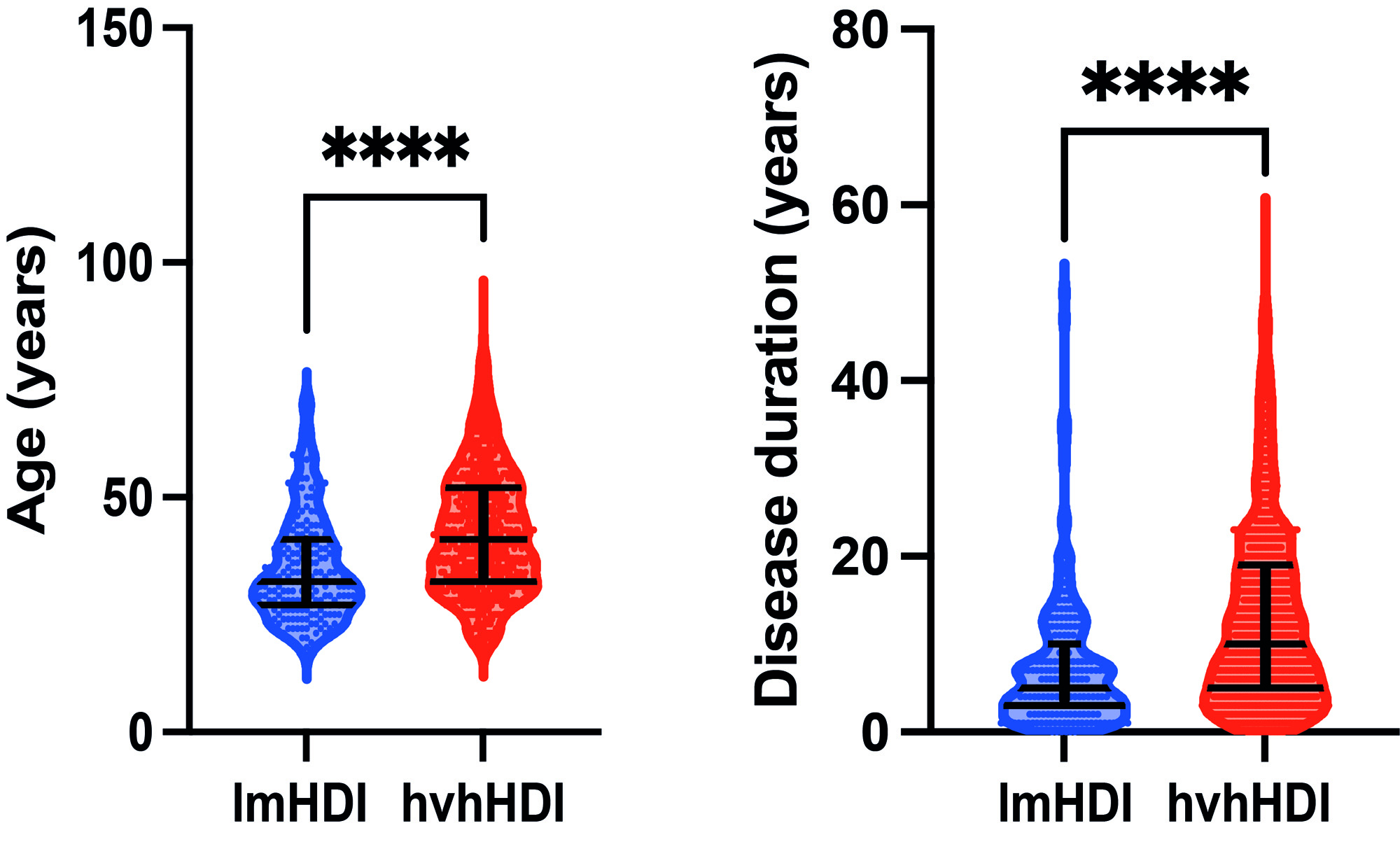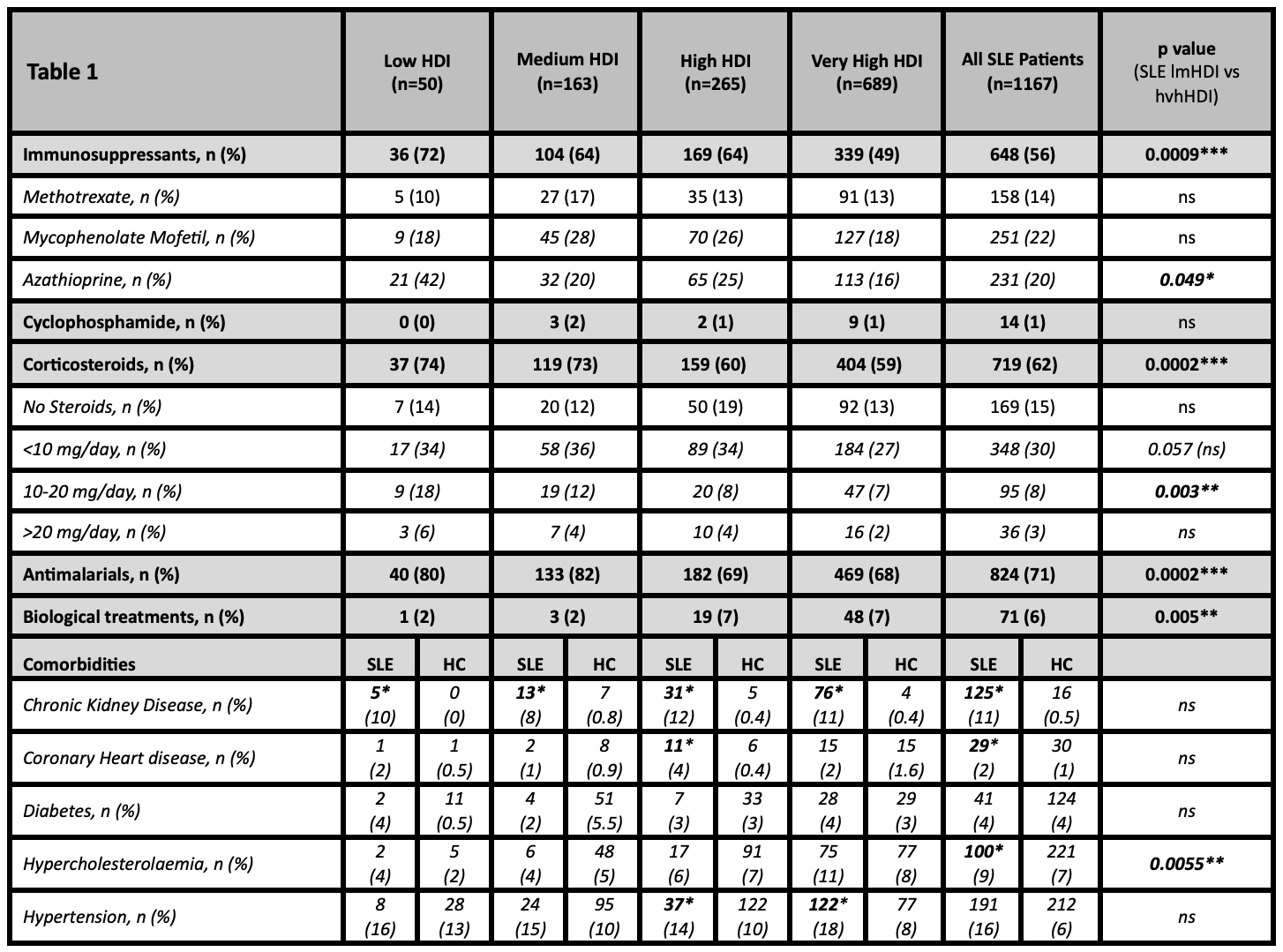Session Information
Date: Tuesday, November 14, 2023
Title: (2257–2325) SLE – Diagnosis, Manifestations, & Outcomes Poster III
Session Type: Poster Session C
Session Time: 9:00AM-11:00AM
Background/Purpose: Regional disparities in the management of SLE are frequently described. Governance, funding, logistic barriers, and physician choice may be important determinants though data is scare from many underrepresented regions thus limiting our understanding and ability to appraise this. Steroids are a key contributor to damage and the use of steroid sparing medication has an important role in reducing these complications. In this study, we sought to evaluate global patterns in the treatment of SLE and identify the prevalence of steroid related comorbidities.
Methods: We identified SLE patients from the COVAD 2 database, an international study of over 20,000 respondents. Data collection included, demographics, comorbidities, treatment including; corticosteroids (CS), antimalarials, immunosuppressants (IS), cyclophosphamide and biologics. Country Human Development Index (HDI) classification, a composite index formulated by the United Nations to rank countries into tiers of development, was utilised. Statistical analysis comprised of Chi square for comparison of categorical values and t-test for comparison between groups. Significance was defined as p< 0.05.
Results: A total of 1167 patients with SLE were included in analysis. As shown in Figure 1, patients from low/medium HDI (lmHDI) countries were significantly younger than those from high/very high HDI (hvhHDI) countries (median age 32, IQR 27-41 vs 41, IQR 32-52 years, p< 0.0001). In addition, disease duration was shorter in lmHDI countries (median 5, IQR 3-10 vs 10, IQR 5-19 years, p< 0.0001). As shown in Table 1, a higher proportion of SLE patients from lmHDI countries were on CS (73% vs 59%, p=0.0002), antimalarials (81% vs 68%, p=0.0002) and IS (66% vs 53%, p=0.0009) compared with patients from hvhHDI countries. Biologic use was more common in hvhHDI countries (7% vs 2%, p=0.0055). Comorbidity prevalence was similar between groups, however when adjusted for age, these were observed in younger patients from lmHDI countries than hvhHDI countries (with shorter disease durations), thus suggesting earlier steroid related complications. Patients with chronic kidney disease were significantly younger patients in lmHDI countries than hvhHDI countries (36.67 vs 44.64 years, p=0.015). Those with coronary artery disease (35.7 vs. 44.6 years, p=0.015) and hypertension (41.5 vs 49.8 years, p=0.003) were also younger in lmHDI countries.
Conclusion: In this large international study evaluating treatment and steroid related comorbidity incidence in SLE populations based on country HDI we identified several differences in pharmacological management globally. Whilst there was no significant difference in the incidence of comorbidities, these occurred in younger patients and earlier in the disease course in those from lmHDI countries. CS use was higher in lmHDI countries and may be a key contributor to the increased incidence in these comorbidities. Interestingly, Hydroxychloroquine, which has frequently been shown to reduce damage and cardiovascular comorbidities was more commonly used in lmHDI countries but these comorbidities persisted. Further studies are required to identify other factors contributing to this earlier development of comorbidities.
To cite this abstract in AMA style:
Holloway A, Lee S, Nikiphorou E, Parodis I, Appenzeller S, R N, Day J, Joshi M, Saha S, Shaharir S, Katchamart W, Akarawatcharangura Goo P, Traboco L, Chen Y, Sen P, Lilleker J, Nune A, Pauling J, Tan A, Ziade N, Milchert M, Gracia-Ramos A, Caballero C, Study Group C, Agarwal V, Aggarwal R, Gupta L, Wincup C. Evaluating Global Patterns in Treatment and Prevalence of Glucocorticoid Related Comorbidities in Systemic Lupus Erythematosus: An International Study [abstract]. Arthritis Rheumatol. 2023; 75 (suppl 9). https://acrabstracts.org/abstract/evaluating-global-patterns-in-treatment-and-prevalence-of-glucocorticoid-related-comorbidities-in-systemic-lupus-erythematosus-an-international-study/. Accessed .« Back to ACR Convergence 2023
ACR Meeting Abstracts - https://acrabstracts.org/abstract/evaluating-global-patterns-in-treatment-and-prevalence-of-glucocorticoid-related-comorbidities-in-systemic-lupus-erythematosus-an-international-study/


